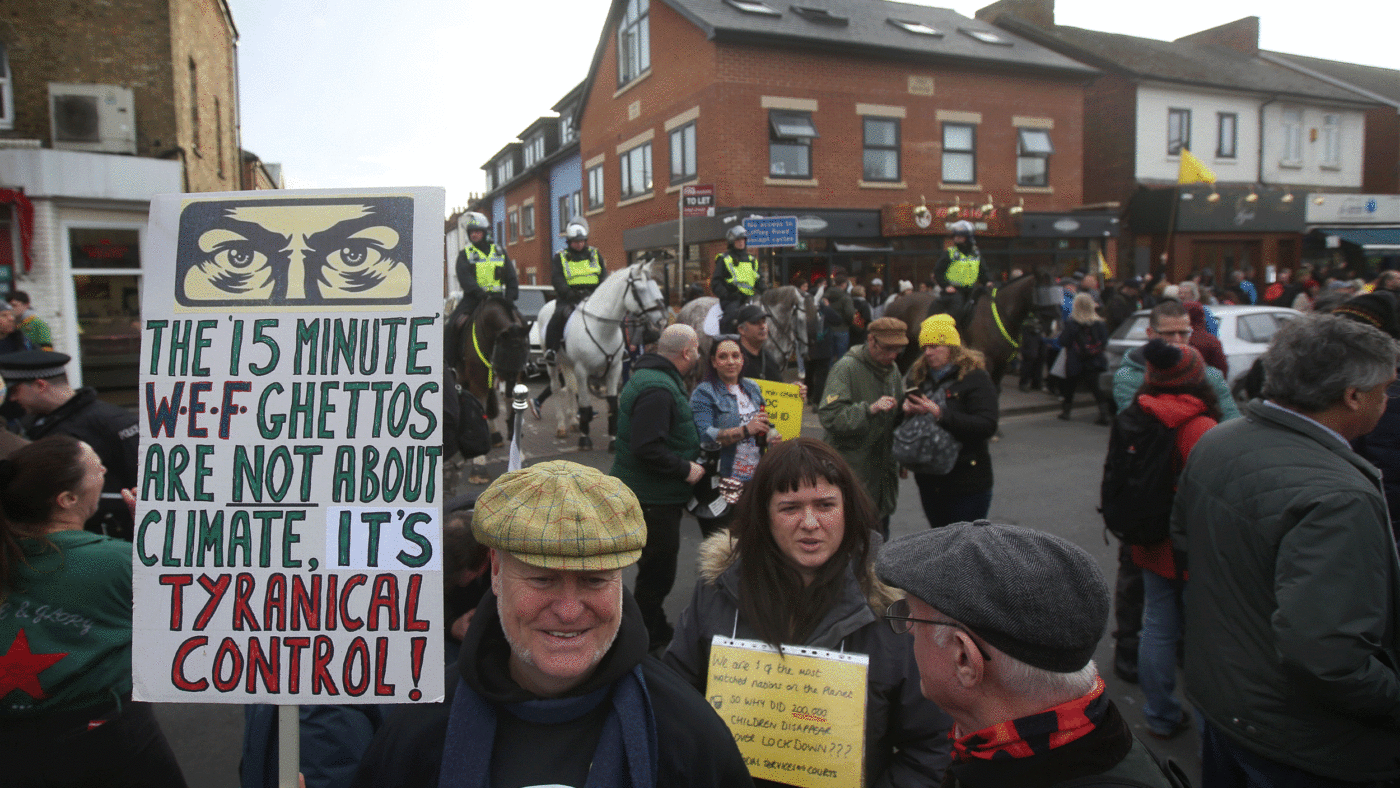In February, a protest against planned traffic reduction measures took a surprising turn, as around 2,000 people took to the streets carrying placards with slogans about ’15 minute ghettos’, ‘the new world order’, and exhorting onlookers to, ‘wake up, people, wake up’. The historic city has become a flashpoint for very modern conspiracy theories around the concept of 15-minute cities. But these protesters are missing the point. Forget the idea that sinister town planners wish to lock people in prison cities – the real question is, whose 15 minutes?
The ’15-minute city’ is really just a pithy new slogan attached to an old concept. Urban planners have been talking about the importance of localism and mixed-use neighbourhoods for years. It was a prominent component in the election campaigns of Anne Hidalgo, mayor of Paris since 2014. The gloriously extravagant $500bn new city in Saudi Arabia Neom – The Line, though 170km long (and only 200 meters wide), has promised that residents will have access to all facilities within a five-minute walk. The idea of an area that provides its residents’ education, healthcare, work, and culture within a 15-minute cycle ride from home sounds nice – but the big problem is inequality.
The creation of 15-minute cities is likely to lock-in prosperity for some and deprivation in other urban bubbles. The phenomenon has already been seen globally in the rise of privileged gated communities. Take the Scottish city of Glasgow as an example. Some urban bubbles of the city are characterised by spacious prosperity and some by chronic deprivation, childhood poverty, high youth suicide, and alcoholism. The most striking inequality is not between Glasgow and other cities and regions of the UK, but between different areas within Glasgow where male life expectancy can differ by over 15 years.
Where I live in Tooting Broadway in South London, I am lucky to have a doctor’s surgery, supermarket, a nice pub, a nursery, a Tube station and a park all within a 15-minute walk of my front door. I’m able to work from home for international think tanks and like many of my friends in London, I don’t own a car as there is no need. If I want to travel across town for restaurants and nightlife, I can take taxis or public transport. In other words, I dabble in the 15-minute city at my pleasurable convenience. But my convenience is contingent on the work of others – the local service labour working in low-paid occupations in coffee shops, restaurants, supermarkets, and delivery firms like Deliveroo. My 15-minute city is someone else’s economic trap.
Alain Bertaud has written about ‘cities as labor markets’. A well-functioning labour market is structured around the interaction of a diverse population and specialized jobs wherein workers, consumers, and suppliers exchange labour, goods, and ideas with ease. The 15-minute city contradicts this economic rationale. Successful employers do not select their employees based on their places of residence; neither do specialised workers select their jobs based on proximity to their residences. Working remotely in London, I am part of a global labour market that matches my skills and experience to job satisfaction and income. But if the labour that enables me to do that is confined to a 15-minute city, they will be deprived of choice in occupation, confined to the labour market of a small urban bubble. Some of those bubbles are marked by good amenities and high house prices, and some by poor amenities and lower house prices – either way, the poor lose out.
So I say ‘yes’ to some of the (not very innovative) ideas of the 15-minute city – more local services such as health and education, more local retail and coffee shops, a greater emphasis on local cycling and its associated health and environmental benefits. But as to making it a goal of urban planning, it’s a definite ‘no’. Cities can be engines of economic growth, poverty reduction, and cultural and retail opportunity when they operate with a city-wide labour market.
The poor in the UK, and then around the world, escaped from the poverty of agrarian life in the 19th century for the opportunities of urban industrialisation. Trying to re-create 15-minute villages would be turning the clock back on 200 years of social and economic progress. Cities should emphasise affordability (of housing) and mobility (of labour) to provide choice to the poor and ensure that they retain their role as engines of inclusive economic growth.
I love the 15-minute feel when I walk around Tooting, but growing up in a rural town that took the same length time to traverse in its picturesque entirety, I couldn’t wait to leave. The reason cities have been so historically socially transformative is precisely because they enable people to escape their 15-minute bubbles.
Click here to subscribe to our daily briefing – the best pieces from CapX and across the web.
CapX depends on the generosity of its readers. If you value what we do, please consider making a donation.


